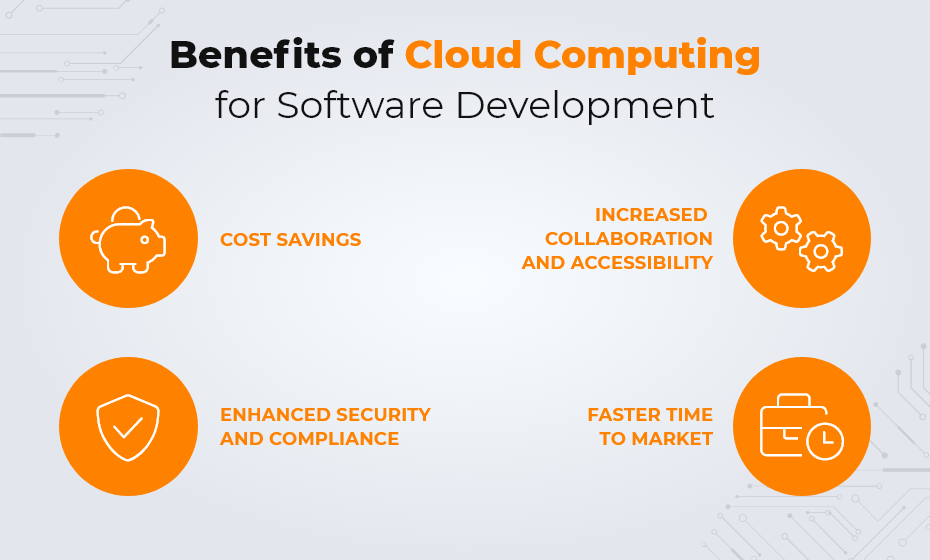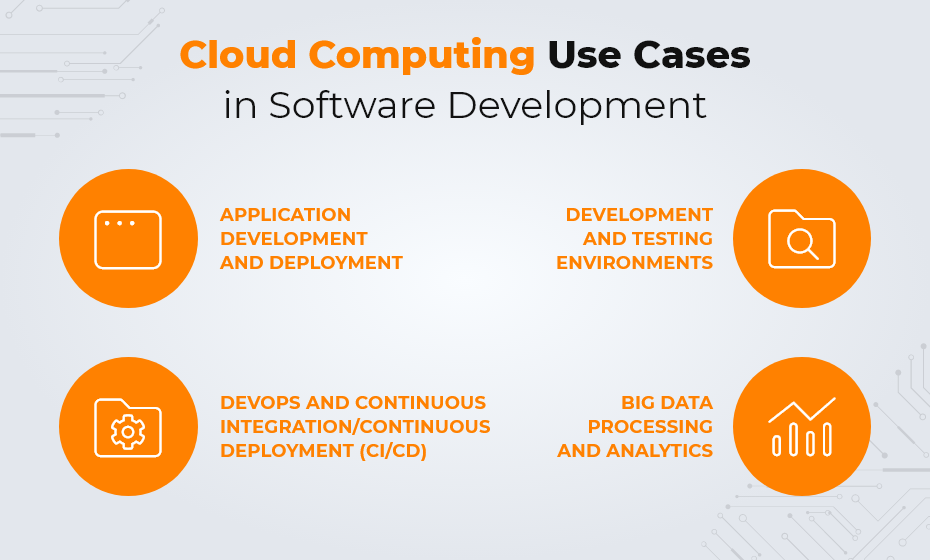
Cloud computing has revolutionized the way businesses develop, deploy, and maintain software applications. It offers a myriad of benefits, from cost savings and increased collaboration to enhanced security and faster time to market. In this article, we will explore the benefits of cloud computing for software development and delve into some real-world use cases to showcase its potential.
Benefits of cloud computing for software development

Cost savings
One of the primary advantages of cloud computing is the significant cost savings it offers. Cloud-based development reduces the need for expensive hardware and infrastructure investments, as resources can be provisioned on-demand. Additionally, cloud computing platforms typically provide pay-as-you-go pricing models, allowing businesses to scale resources up or down as needed and only pay for what they use.
Read on: The Real Cost Of Migrating Your Application Stack To The Cloud.

Increased collaboration and accessibility
Cloud computing enables seamless collaboration among team members, regardless of their geographical location. Developers can access project files, tools, and resources remotely, leading to improved productivity and communication. Real-time collaboration and version control are also made possible through cloud-based development tools, ensuring teams work efficiently and stay in sync.

Enhanced security and compliance
Data protection is a top priority for any software development team. Cloud computing platforms typically offer robust security measures, including data encryption, access controls, and regular security updates. Furthermore, many cloud providers adhere to strict industry standards and regulations, helping businesses maintain compliance with relevant laws and guidelines.

Faster time to market
Cloud-based development allows for the rapid prototyping, testing, and deployment of software applications. This agility can significantly reduce time to market, giving businesses a competitive edge. Continuous integration and continuous delivery (CI/CD) pipelines are also more easily implemented in the cloud, streamlining the entire development lifecycle.

Cloud computing use cases in software development

Application development and deployment
Cloud computing simplifies the process of developing and deploying applications. Cloud-native applications can be built using microservice architecture and serverless computing, enabling rapid scaling and greater resilience. This approach accelerates application release cycles and allows for seamless updates and improvements.

Development and testing environments
Provisioning on-demand test environments is a breeze with cloud computing. Developers can quickly spin up and tear down environments as needed, enabling parallel testing and automated test execution. Additionally, replicating environments for debugging and troubleshooting purposes becomes more efficient in the cloud.

DevOps and Continuous Integration/Continuous Deployment (CI/CD)
Cloud computing facilitates seamless integration between development, testing, and deployment processes. With automated build, test, and deployment pipelines, teams can ensure a consistent and reliable workflow. This improved collaboration between development and operations teams leads to a more streamlined and efficient software development process.

Big data processing and analytics
Cloud computing provides scalable storage and processing capabilities for large datasets, enabling real-time data analysis and visualization. Machine learning and AI integration are also simplified in the cloud, allowing developers to harness the power of predictive insights to drive innovation and improve application performance.

Popular cloud computing platforms for software development
There are several leading cloud computing platforms, including Amazon Web Services (AWS), Microsoft Azure, and Google Cloud Platform (GCP). Each platform offers a unique set of features and services tailored to different development needs. When selecting a platform, businesses should consider factors such as available tools, scalability, and cost-effectiveness.
Interested in learning more about the major cloud computing platforms? Check out our articles on Microsoft Azure, Google Cloud Platform, and Amazon Web Services to learn more about the services and benefits of each platform.
Cloud computing with Rare Crew
Cloud computing has become an essential component of modern software development. By harnessing its benefits and implementing real-world use cases, businesses can streamline their development processes, reduce costs, and drive innovation. With the ever-evolving landscape of cloud computing, staying up-to-date with the latest trends and technologies is crucial for businesses looking to remain competitive in today's fast-paced digital world. By embracing cloud-based development solutions, organizations can unlock the full potential of their software development teams and create powerful, scalable applications that meet the demands of the modern business landscape.
Rare Crew provides cloud computing services for businesses looking to benefit from the cost savings and agilty that cloud computing brings. With the satisfaction of our clients as top priority, we build quality custom software to streamline your business and provide the ROI that will help boost you to the top.
Have a custom software solution in mind? Get in touch with us and we will help realize your vision.